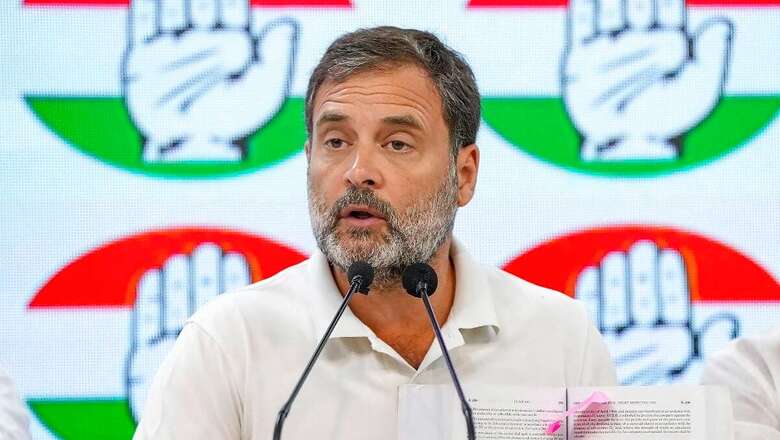
views
With just hours left before the deadline to file nominations, the Congress party’s scion finally took the call. Rahul Gandhi will contest from Uttar Pradesh. But he won’t contest from his own pocket borough Amethi. Instead, Rahul has opted for his mother, Sonia Gandhi’s vacated seat, Raebareli.
Raebareli is a much safer option. It has been nursed by a Nehru-Gandhi since independent India’s first election in 1952. Most importantly, it has only ever turned its back on a Gandhi family member once. That was in 1977 when Indira imposed the Emergency and alienated the public.
In the end, by opting for a safe seat, Rahul Gandhi appears to have lost the stomach for a fight against the BJP’s Smriti Irani who unseated him. By demonstrating that he has no desire to reclaim what was his, even if it is only to stamp his authority back on the electoral scene, many will assume he’s thrown in the towel.
ALSO READ: A Gandhi-Less Fight in Amethi, No Sonia Show in Raebareli This Time, History of Congress Citadels
Even so, there are perhaps three tactical reasons why Rahul Gandhi has decided to opt for Raebareli.
First, to signal that in the line of succession, he gets first dibs and not his sister Priyanka Gandhi Vadra. After all, as already pointed out, Raebareli is well and truly the true-blue Gandhi bastion – and thus a worthy inheritance. It is for Rahul Gandhi now to decide who will succeed him.
Second, given Raebareli’s tight embrace with all things Gandhi, it will be easier for Rahul to justify opting to hold on to it over his seat in Wayanad if he were to win both contests. With Kerala Assembly polls scheduled for mid-2026, Rahul can’t afford to give voters there the impression that he only used the state as a conduit to the Lok Sabha. The Congress believes that Kerala voters will be far more understanding when they realise that Rahul Gandhi gave up Wayanad not for just any seat, but for a family heirloom.
Third, by forsaking Amethi, Rahul Gandhi wants to send out the message that the democrat in him was ready to sacrifice his seat to provide an opportunity to a party colleague to enter the Lok Sabha. The Congress believes that the “Amethi sacrifice” blunts PM Modi’s “entitled Gandhis” charge.
While the Congress scion has his reasons, the BJP, particularly Modi, is wasting little time in driving home the point that Rahul Gandhi has fled a contest against Smriti Irani. This alleged cop-out, the BJP claims, is confirmation that the Congress and Rahul Gandhi have accepted that the BJP is entrenched in Uttar Pradesh and beyond.
ALSO READ: ‘Daro Mat, Bhaago Mat’: PM Modi On Rahul Gandhi Ditching Amethi For Raebareli
This is not to say that Rahul Gandhi is assured of a victory in Raebareli. The Congress isn’t sitting pretty there either. Sonia Gandhi’s own victory margins in the bastion have been shrinking. In the 2019 Lok Sabha election, BJP’s Dinesh Pratap Singh managed to halve Sonia Gandhi’s winning margin. That erosion mirrors the chunk of votes Smriti Irani shaved off Rahul’s winning vote tally in Amethi in 2014. Five years later she defeated him. Will Singh be 2019’s giant killer?
Interestingly, Dinesh Pratap Singh, who is a minister in the Yogi Adityanath state cabinet, is no stranger to Rahul Gandhi or the Raebareli Congress unit. Singh only quit the Congress in 2018 to join the BJP. Besides the ‘Singh factor’, the Congress performance in Raebareli hasn’t been up to the mark.
On some key socio-economic indicators, the constituency lags substantially. Infant mortality rates in Raebareli are almost twice that of the national average. On neo-natal fatalities, it also trails the national average. This is perhaps because only five of 52 Primary Health Centres (PHCs) were operational 24×7 in the constituency according to a UP government report for 2022-2023. On the question of fully functional tap water connections too, it underperforms when compared to the national average.
In the Modi era, voter aspirations have gone through the proverbial roof. And there’s now plenty of data to show that voters are a lot less obliging. According to a study conducted by political scientist Pradeep Chibber, bastions held by political parties are no longer safe. Studying granular polling booth level results for 2014 and 2019 general elections, Chibber’s study concludes that the same party was able to capture more than 50 per cent of the votes only in about a quarter (25 per cent) of the localities. The data reveals that only an incumbent’s productivity matters, not his parivar’s legacy.
Views expressed in the above piece are personal and solely that of the author. They do not necessarily reflect News18’s views.




















Comments
0 comment